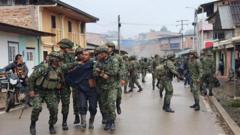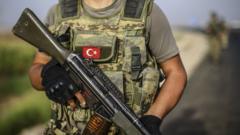In a decisive military rescue operation, the Colombian army successfully freed 57 soldiers who had been held captive by locals for several days in the Cauca region, a known stronghold of the EMC rebel group. The defense minister reported that the operation, dubbed "Operation Justice," involved no gunfire and resulted in the arrest of 20 individuals connected to the kidnapping.
Colombian Army Executes Successful Operation to Rescue Soldiers from Local Captors

Colombian Army Executes Successful Operation to Rescue Soldiers from Local Captors
A military operation in Colombia freed 57 soldiers held by locals amidst escalating tensions with the EMC rebel group.
The article text:
The Colombian military successfully executed "Operation Justice," freeing 57 soldiers who had been held captive by locals in the mountainous Cauca region of Colombia since the weekend. The operation, confirmed by Defense Minister Pedro Sánchez, was notable for the absence of gunfire during the rescue, emphasizing a strategic approach to dealing with the volatile situation.
The incident began when soldiers apprehended a suspected EMC rebel on Saturday. In response, a crowd of over 100 locals surrounded the soldiers as they attempted to airlift the suspect from the area. The next day, a second military unit faced similar circumstances and was seized by an even larger group. This marked a significant escalation in the interactions between local civilians and military forces, as such incidents usually involve quicker negotiations with humanitarian organizations for the release of captured personnel.
According to Minister Sánchez, the local population's actions were driven by orders from the EMC rebel group, notorious for its engagement in cocaine production and trafficking. The military's response saw additional troops deployed to the region, leading to the arrest of 20 individuals associated with the kidnapping.
The Cauca region, where this incident occurred, is heavily reliant on coca farming—used in cocaine production—leaving over 90% of its inhabitants dependent on the crop for subsistence. The military presence is often viewed as a threat by local farmers, who face pressures and extortion from armed groups. The region's delicate balance of power, influenced by various illegal activities such as mining and drug trafficking, complicates the interactions between military forces and local communities.
This incident comes amid a spate of targeted attacks against Colombian security forces, where recent weeks have seen an alarming rise in violence resulting in the deaths of dozens of servicemen. With tensions expected to persist, the Colombian government faces a challenging road ahead in addressing the dual issues of local insurgency and the narcotics trade that affects their security operations.
The Colombian military successfully executed "Operation Justice," freeing 57 soldiers who had been held captive by locals in the mountainous Cauca region of Colombia since the weekend. The operation, confirmed by Defense Minister Pedro Sánchez, was notable for the absence of gunfire during the rescue, emphasizing a strategic approach to dealing with the volatile situation.
The incident began when soldiers apprehended a suspected EMC rebel on Saturday. In response, a crowd of over 100 locals surrounded the soldiers as they attempted to airlift the suspect from the area. The next day, a second military unit faced similar circumstances and was seized by an even larger group. This marked a significant escalation in the interactions between local civilians and military forces, as such incidents usually involve quicker negotiations with humanitarian organizations for the release of captured personnel.
According to Minister Sánchez, the local population's actions were driven by orders from the EMC rebel group, notorious for its engagement in cocaine production and trafficking. The military's response saw additional troops deployed to the region, leading to the arrest of 20 individuals associated with the kidnapping.
The Cauca region, where this incident occurred, is heavily reliant on coca farming—used in cocaine production—leaving over 90% of its inhabitants dependent on the crop for subsistence. The military presence is often viewed as a threat by local farmers, who face pressures and extortion from armed groups. The region's delicate balance of power, influenced by various illegal activities such as mining and drug trafficking, complicates the interactions between military forces and local communities.
This incident comes amid a spate of targeted attacks against Colombian security forces, where recent weeks have seen an alarming rise in violence resulting in the deaths of dozens of servicemen. With tensions expected to persist, the Colombian government faces a challenging road ahead in addressing the dual issues of local insurgency and the narcotics trade that affects their security operations.

















